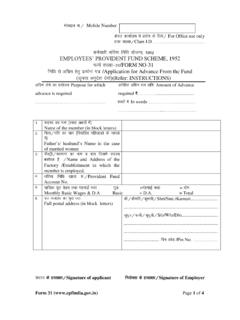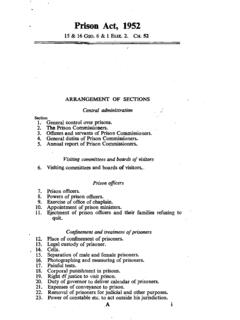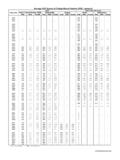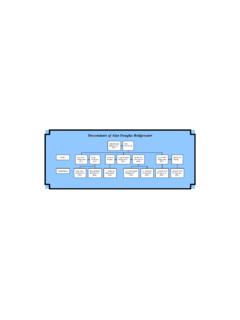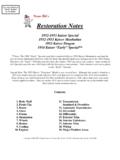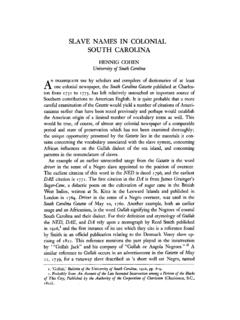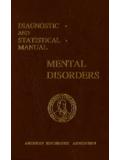Transcription of THE EMPLOYEES’ PROVIDENT FUNDS AND …
1 THE EMPLOYEES PROVIDENT FUNDS AND miscellaneous provisions ACT, 1952 (Act No. 19 of 1952 ) 4th March, 1952 An Act to provide for the institution of PROVIDENT FUNDS , pension fund and deposit-linked insurance fund for employees in factories and other establishments. Be it enacted by Parliament as follows:- 1. Short title, extent and (1) This Act may be called the Employees PROVIDENT FUNDS and miscellaneous provisions Act, 1952 . (2) It extends to the whole of India except the State of Jammu and Kashmir. (3) Subject to the provisions contained in section 16, it applies - (a) to every establishment which is a factory engaged in any industry specified in Schedule I and in which twenty or more persons are employed and (b) to any other establishment employing twenty or more persons or class of such establishments which the Central Government may, by notification in the Official Gazette, specify, in this behalf: Provided that the Central Government may, after giving not less than two months notice of its intention so to do, by notification in the Official Gazette, apply the provisions of this Act to any establishment employing such number of persons less than twenty as may be specified in the notification.
2 (4) Notwithstanding anything contained in sub-section 3 of this section or-sub-section 1 of section16, where it appears to the Central PROVIDENT fund Commissioner, whether on an application made to him in this behalf or otherwise, that the employer and the majority of employees in relation to any establishment have agreed that the provisions of this Act should be made applicable to the establishment, he may, by notification in the Official Gazette, apply the provisions of this Act to that establishment on and from the date of such agreement or from any subsequent date specified in such agreement. (5) An establishment to which this Act applies shall continue to be governed by this Act notwithstanding that the number of persons employed therein at any time falls below twenty.
3 2. Definitions. - In this Act, unless the context otherwise requires, - (a) Appropriate Government means - (i) in relation to an establishment belonging to, or under the control of, the Central Government or in relation to, an establishment connected with a railway company, a major port, a mine or an oil-filed or a controlled industry or in relation to an establishment having departments or branches in more than one State, the Central Government: and (ii) in relation to any other establishment, the State Government: (aa) authorised officer means the Central PROVIDENT fund Commissioner, Additional Central PROVIDENT fund Commissioner, Deputy PROVIDENT fund Commissioner, Regional PROVIDENT fund Commissioner or such other officer as may be authorised by the Central Government, by notification in the Official Gazette; (b) basic wages means all emoluments which are earned by an employee while on duty or on leave or on holidays with wages in either case in accordance with the terms of the contract of employment and which are paid or payable in cash to him, but does not include- (i) the cash value of any food concession.
4 (ii) any dearness allowance that is to say, all cash payments by whatever name called paid to an employee on account of a rise in the cost of living, house-rent allowance, overtime allowance, bonus, commission or any other similar allowance payable to the employee in respect of his employment or of work done in such employment; (iii) any presents made by the employer; (c) Contribution means a contribution payable in respect of a member under a scheme or the contribution payable in respect of an employee to whom the Insurance Scheme applies; (d) controlled industry means any industry the control of which by the Union has been declared by a Central Act to be expedient in the public interest; (e) employer means- (i) in relation to an establishment which is a factory, the owner or occupier of the factory, including the agent of such owner or occupier, the legal representative of a deceased owner or occupier and, where a person has been named as a manager of the factory under clause f of sub-section 1 of section 7 of the Factories Act, 1948 (63 of 1948), the person so named; and (ii) in relation to any other establishment, the person who, or the authority which, has the ultimate control over the affairs of the establishment, and where the said affairs are entrusted to a manager, managing director or managing agent, such manager, managing director or managing agent.
5 (f) employee means any person who is employed for wages in any kind of work, manual or otherwise, in or in connection with the work of an establishment and who gets his wages directly or indirectly from the employer, and includes any person,- (i) employed by or through a contractor in or in connection with the work of the establishment; (ii) engaged as an apprentice, not being an apprentice engaged under the Apprentices Act, 1961 (52 of 1961) or under the standing orders of the establishment; (ff) exempted employee means an employee to whom a Scheme or the Insurance Scheme, as the case may be, would, but for the exemption granted under section 17, have applied; (fff) exempted establishment means an establishment in respect of which an exemption has been granted under section 17 from the operation of all or any of the provisions of any Scheme or the Insurance Scheme, as the case may be, whether such exemption has been granted to the establishment as such or to any person or class of persons employed therein; (g) factory means any premises, including the precincts thereof, in any part of which a manufacturing process is being carried on or is ordinarily so carried on, whether with the aid of power or without the aid of power; (gg) ** (ggg) ** (h) fund means the PROVIDENT fund established under a Scheme; (i) industry means any industry specified in Schedule I, and includes any other industry added to the Schedule by notification under section 4.
6 (ia) Insurance fund means the Deposit-linked Insurance Scheme framed under sub-section 2 of section 6C; (ib) Insurance Scheme means the Employees Deposit-linked Insurance Scheme framed under sub-section 1 of section 6C; (ic) manufacture or manufacturing process means any process for making, altering, repairing, ornamenting, finishing, packing, oiling, washing, cleaning, breaking up, demolishing or otherwise treating or adapting any article or substance with a view to its use, sale, transport, delivery or disposal; (j) member means a member of the fund ; (k) occupier of a factory means the person, who has ultimate control over the affairs of the factory, and, where the said affairs are entrusted to a managing agent, such agent shall be deemed to be the occupier of the factory; (kA) Pension fund means the Employees Pension fund established under sub-section 2 of section 6A; (kB) Pension Scheme means the Employees Pension Scheme framed under sub-section 1 of section 6A; (ka) prescribed means prescribed by rules made under this Act; (kb) Recovery Officer means any officer of the Central Government, State Government or the Board of Trustees constituted under section 5A, who may be authorised by the Central Government, by notification in the Official Gazette, to exercise the powers of a Recovery Officer under this Act.
7 (l) Scheme means the Employees PROVIDENT FUNDS scheme framed under section 5; (l1) superannuation , in relation to an employee , who is the member of the Pension Scheme, means the attainment, by the said employee , of the age of fifty-eight years. (m) Tribunal means the Employees PROVIDENT FUNDS Appellate Tribunal constituted under section 7D. 2A. Establishments to include all departments and branches. - For the removal of doubts, it is hereby declared that where an establishment consists of different departments or has branches, whether situate in the same place or in different places, all such departments or branches shall be treated as parts of the same establishment. 3. Power to apply Act to an establishment which has a common PROVIDENT fund with another establishment.
8 - Where immediately before this Act becomes applicable to an establishment there is in existence a PROVIDENT fund which is common to the employees employed in that establishment and employees in any other establishment, the Central Government may, by notification in the Official Gazette direct that the provisions of this Act shall also apply to such other establishment. 4. Power to add to Schedule I. (1) The Central Government may, by notification in the Official Gazette, add to Schedule I any other industry in respect of the employees whereof it is of opinion that a PROVIDENT fund Scheme should be framed under this Act, and thereupon the industry so added shall be deemed to be an industry specified in Schedule I for the purpose of this Act. (2) All notifications under sub-section 1 shall be laid before Parliament, as soon as may be, after they are issued.
9 5. Employees PROVIDENT FUNDS Scheme. (1) The Central Government may, by notification in the Official Gazette, frame a scheme to be called the Employees PROVIDENT fund Scheme for the establishment of PROVIDENT FUNDS under this Act for employees or for any class of employees and specify the establishments or class of establishments to which the said Scheme shall apply and there shall be established, as soon as may be after the framing of the Scheme, a fund in accordance with the provisions of this Act and the Scheme. (1A) The fund shall vest in, and be administered by, the Central Board constituted under section 5A. (1B) Subject to the provisions of this Act, a Scheme framed under sub-section 1 may provide for all or any of the matters specified in Schedule II. (2) A Scheme framed under sub-section 1 may provide that any of its provisions shall take effect either prospectively or retrospectively on such date as may be specified in this behalf in the Scheme.
10 5A. Central Board. - (1) The Central Government may, by notification in the Official Gazette, constitute, with effect from such date as may be specified therein, a Board of Trustees for the territories to which this Act extends hereinafter in this Act referred to as the Central Board consisting of the following persons as members, namely:- (a) a Chairman and a Vice-Chairman to be appointed by the Central Government; (aa) the Central PROVIDENT fund Commissioner, Ex officio; (b) not more than five persons appointed by the Central Government from amongst its officials; (c) not more than fifteen persons representing Governments of such States as the Central Government may specify in this behalf, appointed by the Central Government; (d) ten persons representing employers of the establishments to which the Scheme applies, appointed by the Central Government after consultation with such organisations of employers as may be recognised by the Central Government in this behalf; and (e) ten persons representing employees in the establishments to which the Scheme applies, appointed by the Central Government after consultation with such organisations of employees as may be recognised by the Central Government in this behalf.









